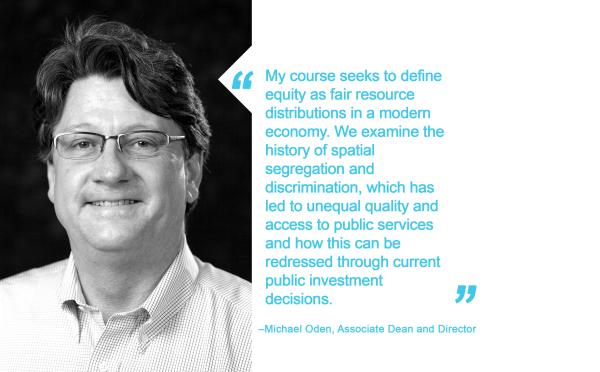Michael Oden, Faculty

In this post, we speak with Michael Oden. Dr. Oden's teaching and research areas include local and regional economic development, regional growth dynamics and regional governance challenges, and program evaluation methodologies. For the past several years, Dr. Oden has been involved in evaluating technologies and planning interventions to mitigate climate change and other environmental hazards.
What program(s) are you associated with in the School? How long have you been at the university?
I am the director of the Community and Regional Planning program and Associate Dean for Research and Operations at the School of Architecture. I have been a full-time faculty at the SOA for 17 years.
In what ways have you incorporated diversity and equity in your teaching and research?
Issues of equity and diversity are at the center of many planning problems. In my Financing Public Services course, we discuss how we define equity in terms of fair resource distributions in a modern economy. We also discuss how the history of spatial segregation and discrimination has led to unequal quality and access to public services and ways this can be redressed through incorporating equity into current public investment decisions.
What does diversity mean to you?
Diversity is difference along many human dimensions –race, ethnicity, gender, sexual orientation, and cultural experiences – to name just some important aspects of diversity. Embracing diversity means not just recognizing and being comfortable with those who are different, but building rich, rewarding, and meaningful relationships with diverse people with different backgrounds and experiences.
Can you describe the sense of community at the School?
The School of Architecture is a tolerant and progressive community but is not as diverse as the state and nation in which we live. We must integrate issues of equity and diversity more deeply into how we think about our teaching, research, and professional lives.
What are your aspirations –big or small– for the future?
We must transform the culture and demographic characteristics of the School to reflect the real diversity in our broader community, but also enrich and deepen our understanding of how diversity is a critical foundation of knowledge, communication, and innovation in our life and work.
